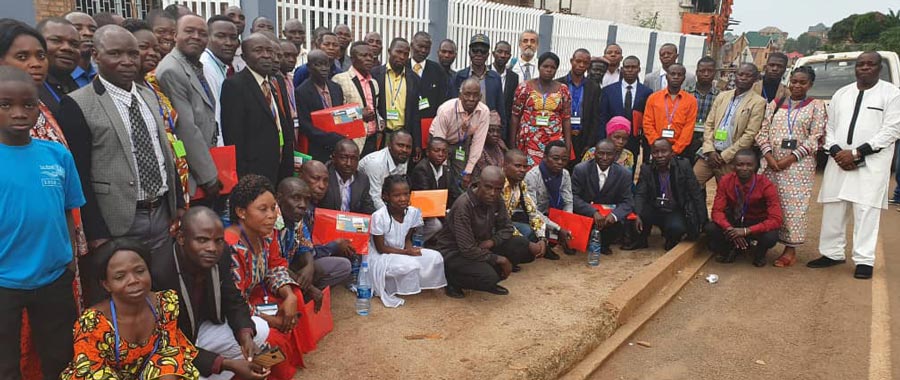In an age where turmoil often overshadows tranquility, the pursuit of lasting peace resonates with profound urgency. The Bahá’í teachings offer an illuminating framework through which the concept of peace may be thoroughly examined. Within this framework, the assertion that chiefs and leaders can be catalysts for peace through the lens of spiritual truths is particularly compelling. How might contemporary leaders translate these timeless tenets into actionable paradigms? This inquiry invites both a playful engagement and a substantive challenge, positioning faith not merely as doctrine, but as an operant tool in the fabric of governance and societal structures.
At the heart of Bahá’í teachings lies the notion that peace is not merely the absence of conflict but rather a dynamic process rooted in the principles of unity, justice, and love. Leaders, symbolized here by chiefs, must embody these principles to achieve a sustainable and harmonious society. The challenge, therefore, lies in reconciling often disparate viewpoints, fostering a culture of inclusivity and understanding. As we delve deeper into this significant theme, we must consider several pivotal aspects: the ethical obligations of leaders, the role of spiritual truths in decision-making, and the transformative power of community dialogue.
One foundational aspect of the Bahá’í perspective on leadership is the ethical obligation that accompanies the role of a chief. Leaders are inherently tasked with the responsibility to safeguard the wellbeing of their communities. This duty transcends mere governance and veers into moral territory, necessitating an adherence to ethical principles that foster trust and respect among constituents. The very essence of effective leadership is manifested through acts of compassion, integrity, and benevolence—qualities extolled in the Bahá’í faith. Ethical leadership, therefore, is not solely a practice but a paradigm that inspires followers to cultivate their own moral compasses, resulting in a collective pivot towards peace in the socio-political landscape.
Moreover, the processes of decision-making in leadership are inherently influenced by one’s spiritual beliefs. In the Bahá’í view, the interplay between spirituality and leadership cannot be understated. Leaders who align their decisions with spiritual truths exhibit a heightened awareness of the broader implications of their actions. This perspective engenders a commitment to justice and equity, as spiritual truths are closely intertwined with human dignity and rights. This intrinsic correlation challenges leaders to reflect upon their motivations and the ramifications of their choices in both the short-term and long-term contexts.
Leadership mirrors the further complexities associated with collective governance. The Bahá’í teachings advocate for the practice of consultation as a pathway to genuine involvement and ownership among community members. This method engenders a democratic ethos, allowing diverse voices to contribute to the decision-making process. Consequently, chiefs can harness the collective wisdom of their community, promoting unity in diversity. The dynamism of consultation elevates societal discourse, cultivating an environment where differing opinions can coexist and ultimately converge towards common goals. However, the challenge amplifies as leaders must remain vigilant against biases, ensuring that consultation reflects a genuine representation of the community rather than a mere illusion of participation.
Furthermore, in navigating the complexities of modern leadership, the Bahá’í teachings advocate for the sincere application of spiritual principles to social and political issues. Principally, there exists a compelling call to action. Addressing pressing topics such as poverty, injustice, and environmental degradation necessitates a synthesis of spiritual and temporal elements. Chiefs must leverage their influence to inspire collaborative efforts that transcend parochial interests. By championing initiatives rooted in compassion and equity, a true climate of peace can emerge. This comprehensive understanding compels an exploration into the mechanisms through which practical applications can manifest.
As we reflect on the role of spiritual teachings as catalysts for peace, it is crucial to acknowledge the inherent challenges faced by leaders in actualizing these ideals. A significant question looms: How do leaders navigate the tensions that arise between spiritual convictions and the pragmatics of governance? The resolution to this dilemma may emerge through the establishment of dialogue-oriented platforms that allow for nuanced discussions, even amidst contention. By fostering environments where diverse perspectives can churn and evolve, chiefs can mitigate polarizing conflicts and cultivate a synergy of thoughts directed towards collective healing.
In closing, the exploration of Bahá’í teachings reveals a nuanced understanding of the vital role of chiefs in seeking lasting peace through spiritual truths. While the journey towards achieving harmonious societies is laden with challenges, leaders equipped with ethical principles, a commitment to spiritual insights, and the ability to facilitate inclusive dialogue are uniquely positioned to effect real change. A question worth pondering is whether contemporary leadership can cultivate such profound transformative potential in a world yearning for tranquility. Indeed, the synthesis of spiritual truths and ethical leadership holds the promise of reimagining communities, emphasizing that peace is the ultimate aspiration towards which humanity collectively strives.
